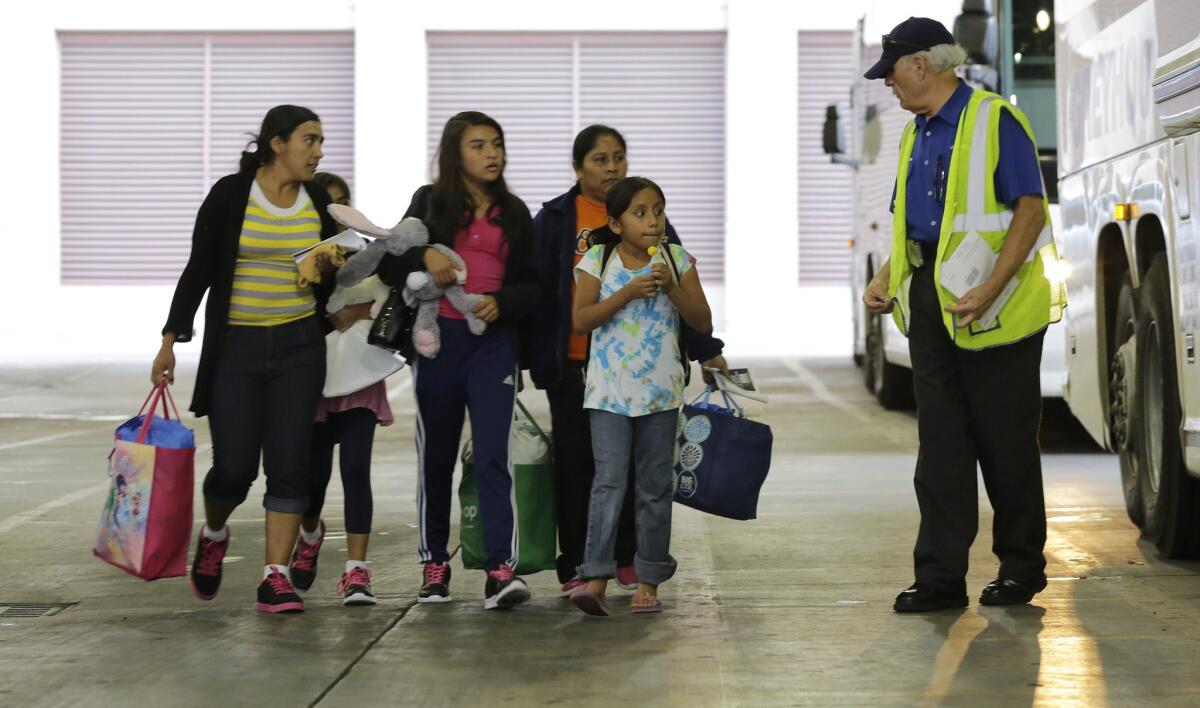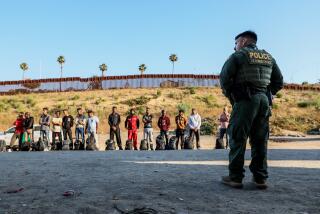Latest complaint on family detention: Few Spanish-speaking staffers

Immigrants from El Salvador and Guatemala who entered the country illegally prepare to board a bus last month in San Antonio after they were released from a family detention center in Texas.
This year, Olivia Lopez was called in to translate for an inconsolable Central American mother held at a detention center with other immigrant families.
Lopez recalled that the woman “would not stop crying.” Clinic staff members explained why.
“The story I was told was she was a prostitute back in her home country and was worried she was pregnant,” she said.
Lopez, a 57-year-old licensed social worker, grew up speaking Spanish. She began asking the woman what was wrong, and an entirely different story emerged of the woman’s life back in Central America.
“What she told me was when she would walk home, a man would rape her repeatedly and she ran away to get away from him,” Lopez said.
The woman was held at a facility in Karnes City, Texas, one of the country’s three family immigration detention centers.
The Obama administration expanded the centers after the southern border was overwhelmed by last summer’s influx of families and unaccompanied children, primarily from Central America. crossing the border illegally. In addition to a 95-bed detention center in Leesport, Pa., the Karnes City facility was opened, along with the South Texas Family Residential Center in Dilley, Texas. This week, the centers’ total was 1,439 adults and children.
The administration suffered a setback late last month when a federal judge in Los Angeles ruled that hundreds of immigrant women and children held at the center should be released, finding their detention “deplorable.” The case is pending.
Immigrants and advocates have filed lawsuits accusing the centers of providing detainees with inadequate legal, medical and other services. They say these deficiencies can be tied, in part, to a basic problem: Many detention center staff members do not speak Spanish.
Last week, attorneys filed affidavits from several women at the Dilley center who alleged that, without their attorneys present, they were coerced to sign legal paperwork by officials who spoke little or no Spanish.
In one affidavit, a woman from El Salvador said an Immigration and Customs Enforcement official at Dilley “simply pointed to a document and told me to sign it…. He did not explain what the document was that I was signing. I could not ask him what the document was or what I was signing because he spoke almost no Spanish at all.”
Lopez said many staff members at the Karnes City center did not speak Spanish, including one of the two social workers she supervised, the doctor and school psychologist. The classes are bilingual, but “the kids don’t have anyone to go to to deal with their issues, so the teachers have to deal with them head on,” Lopez said.
She resigned in April over what she called “unethical” working conditions that she believed endangered her license.
“Having an effective interpreter reduces medical error and increases effective outcomes,” she said.
Attorneys filed a complaint last week with the Department of Homeland Security on behalf of 10 immigrant women who said they and their children had received substandard medical care at the family detention centers. Another lawyer separately sued ICE on behalf of a mother and child who also said they had received substandard care at the Dilley facility.
“What we heard from our clients was that many of the medical people were not fluent in Spanish,” said Andrew Free, a Nashville-based attorney who filed the lawsuit in San Antonio federal court last week on behalf of a 25-year-old Honduran woman who says she did not get adequate medical treatment at Dilley for herself and her 6-year-old daughter, who was vomiting blood.
In response to the complaints, Gillian Christensen, a spokeswoman for U.S. ICE, said the agency “takes very seriously any allegations of mistreatment or abuse at any of its facilities and, when reported, those allegations are investigated fully.”
Nina Pruneda, an ICE spokeswoman, said the agency “is committed to the health and well-being of those in our custody.”
She said the majority of staff members at Karnes City and Dilley speak Spanish and that “ICE family residential centers have full-time interpreters who speak native languages, and 24/7 access to translation services is available by phone.”
She noted that ICE standards do not require contract employees at the family detention centers to speak Spanish, including medical personnel, although it is viewed as a valuable skill.
Critics concede that trained interpreters are available for some services at the centers — for example, detainee hearings before immigration judges.
Corrections Corporations of America, which runs the detention center in Dilley, declined to comment on employee language skills.
Pablo Paez, a Geo Group spokesman, which runs the Karnes City facility, referred questions about staff Spanish fluency to ICE.
He noted that ICE standards for detention centers require that “care providers” plan to recruit staff members “who are culturally sensitive and who speak the language of the residents.”
Detention center officials are directed to ensure that interpreters or bilingual staff members are available in key areas, such as child care and counseling.
“Only in exceptional circumstances, such as the arrival of a resident with an uncommon native language, will this resource not be immediately available,” according to the standards. Still, centers are directed to provide an interpreter within eight hours of admission.
Attorneys representing women at the centers said that doesn’t appear to be happening.
Free, the Nashville lawyer, said a 36-year-old woman he represented had trouble being understood after she arrived at Dilley last month. The woman had fled Guatemala with her 7-year-old son after her husband beat her so severely that he ruptured her left eardrum. The pair, like some others held at the detention centers, spoke an indigenous language, Achi.
“She’d been going to medical every day telling them about the pain in her ear. She would get ear drops, a little pill and a cotton ball. She can’t hear out of her left ear, and there was nobody who spoke Achi or attempted to get anyone on the phone who spoke Achi,” Free said.
After several weeks, Free and his assistant discovered that the woman has a daughter, also in the country illegally, living in California. The woman posted bond and is now living with her daughter in San Rafael.
Matthew Archambeault, a Philadelphia-based immigration lawyer who has represented those at the family detention center in Leesport, said some staff members speak Spanish, but many don’t.
“It sounds ridiculous considering the community they’re serving,” he said. “It’s a huge issue.”
Christensen said that 40% of staff members at the Leesport facility are fluent or conversational in Spanish, with some fluent in other languages, such as Chinese. Translation services, as well as translation apps, are available 24 hours a day; all medical visits involve interpreters when staff members aren’t fluent in the patient’s native language, the agency said.
Jonathan Ryan, executive director of San Antonio-based Refugee and Immigrant Center for Education and Legal Services, said the problem surfaced when he was at the Greyhound station there last month. Ryan joined a group of volunteers at the bus station who aid immigrant families newly released from detention.
As he watched, an ICE agent arrived with a Guatemalan woman and her two children just released from detention. When the family found that their bus to Atlanta had already left, the agent tried to return them to the detention center in Karnes City, Ryan said. He asked the agent for an explanation.
“She said volunteers were scaring the woman and that the woman wanted to return to the detention center,” Ryan recalled.
Ryan, who speaks Spanish, asked the immigrant mother what she wanted to do.
“The woman answered me very clearly in Spanish that she did not want to return to the detention center,” he said. “Only then did the ICE agent admit that she did not speak or understand Spanish.”
Twitter: @mollyhf
More to Read
Sign up for Essential California
The most important California stories and recommendations in your inbox every morning.
You may occasionally receive promotional content from the Los Angeles Times.











